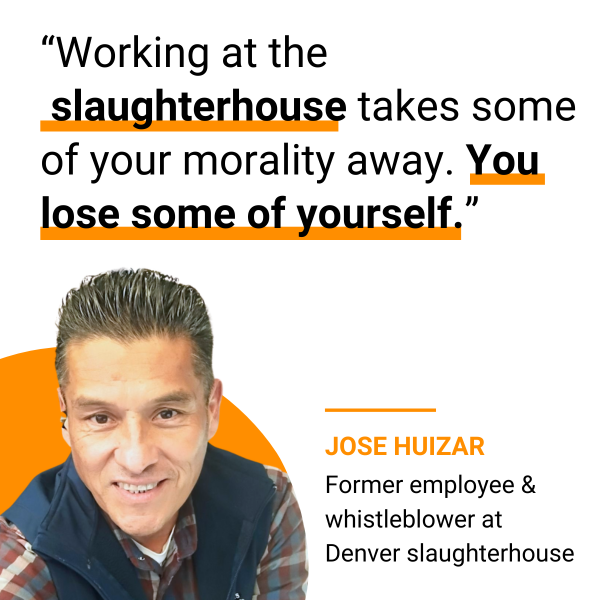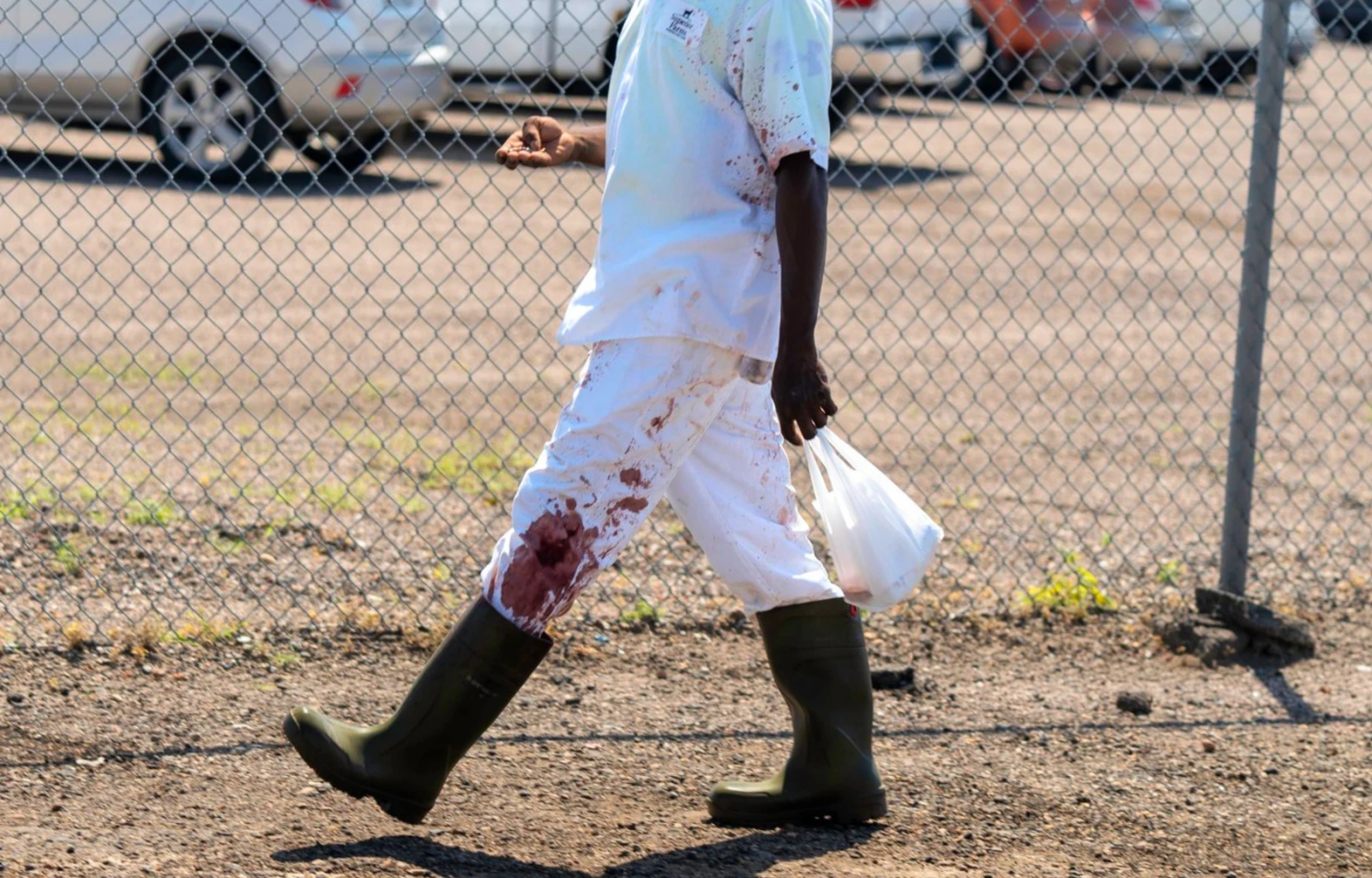This year in Denver, Initiated Ordinance 309 is addressing the disastrous effects slaughterhouses inflict on the environment, animals, and the surrounding neighborhoods and communities. Indeed, some of those most impacted by slaughterhouses are the workers themselves. To learn more, we spoke with Jose Huizar, a lifelong resident of Denver’s Globeville neighborhood who worked on the kill floor at the Superior Farms lamb slaughterhouse, one of the biggest lamb processing facilities in the country.
Known for his warm smile and his tireless work providing meals to elderly residents of the neighborhood, Jose shared his story with us as a call to action for change.

Reflecting on his experience as a former employee at Superior Farms slaughterhouse in Denver and a Globeville resident, here is what Jose told us. Our interview with Jose has been edited for length. Content Advisory: Jose’s story contains graphic and explicit language.
Interview: Jose Huizar, Superior Farms whistleblower
Q: How did working at Superior Farms slaughterhouse affect you and other workers?
Jose: “Working at the slaughterhouse takes some of your morality away. You lose some of yourself.
Once you start slitting throats, stepping in guts, pulling their skin off, you’re degrading an animal to the point where it just becomes a part. It messes with you. It can easily progress to ‘I’m gonna shank this guy when I get pissed off.’
You come home and you’re fucked up, whether from drugs or just from killing animals all day, slitting their throats, spilling their guts, hearing them scream. It disrupts your family dynamic, how you’re supposed to relate to your wife and kids.
I can’t stomach the smell of lamb meat anymore, much less eat it, after seeing what happens there. The thought of what the lambs go through.”
Q: How did people adjust to those conditions?
Jose: “A lot of people cope by drinking. The liquor store across the street would cash paychecks from the slaughterhouse, and a lot of guys would go straight over there after work, or even on breaks. That escalates to drug use. I had never used drugs before but I started using cocaine to be able to make it through the shift, and marijuana to numb out afterward.”
Q: The slaughterhouse employs dozens of people on the kill floor. How does all of this affect the surrounding community?
Jose: “Drug use at the slaughterhouse leads to the formation of malicious groups that start creating havoc in the neighborhood. That’s how it spills out into the community, as small-scale organized crime. I’ve seen shit that you would never have to see anywhere else except for Globeville. Gang stalking, people getting shot. Getting rid of the slaughterhouse could go a long way towards cleaning up the area.”
Q: After working at Superior Farms for a few years, employees can earn an ownership stake in the company. Wasn’t that a bright spot of working there?
Jose: “After 5 or 10 years working there, you get special benefits, but almost nobody lasts that long. It’s not worth it. The consequences of working there that long are brutal.
Guys who work there for a long time, after years, they can’t walk, their knees are gone from arthritis. My older brother worked at a different slaughterhouse for years. Before that he was good in school, and into athletics, a boxer. He became the alcoholic in the family.”
Q: What do you think the future holds for the Globeville neighborhood and the slaughterhouse?
Jose: “It breaks my heart when I see young guys starting to work there. That job set me on the wrong course.
I’m glad the neighborhood is getting cleaned up, but why is it only happening now, when everything is gentrifying? I wish it had happened a long time ago. But better late than never. The sooner that place is gone, the better.”
Is working at Denver’s slaughterhouse really that bad?
Regrettably, the experiences Jose recounted from his time at Denver’s lamb slaughterhouse are not unique, and indicate systemic problems within the industry. Slaughterhouse workers often carry post-traumatic stress related to their jobs. They are at higher risk of engaging in substance abuse and violence. This is according to a review of 14 studies on the Psychological Impact of Slaughterhouse Employment.
U.S. slaughterhouse employees have even been found to have 4x higher rates of depression than the general public.
And Jose’s observation about local crime matches up with two different studies that confirmed: Neighborhoods with slaughterhouses have more arrests for violent crime than areas around other manufacturing industries.
Alarmingly, OSHA records show that a worker in Denver’s slaughterhouse had a finger sliced off in 2019. This is not surprising, as journalists have previously reported two amputations per week in slaughterhouses nationwide. In addition to the risk of sudden injuries, they face a 7x higher risk of repetitive strain injury than workers in other private-sector jobs.
To top it all off, Superior Farms was taken to court in 2017 for animal cruelty and food safety violations at its other lamb slaughterhouse in California and forced to pay $200,000 in fines to the federal government.
It’s time for slaughterhouse workers to be heard
Inside slaughterhouses, people’s bodies and minds pay the price for a company’s profit. In today’s world of abundant harvest, hiring people to kill hundreds of animals a day is unnecessary. To hear more about Jose’s experience, check out his op-ed in the Denver Post about his experience working at Superior Farms slaughterhouse.
We recommend checking out Every Twelve Seconds by Timothy Pachirat, reading Confessions of a Slaughterhouse Worker, and watching Surge Media’s interview of former workers. If you or someone you love has suffered from slaughterhouse employment and wants to see this industry fade forever, we would love to hear from you.
Above all, it’s time for workers to have safer, healthier jobs. Brave New Life Project is a local group that connects slaughterhouse workers with resources to transition to more fulfilling careers.

